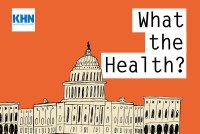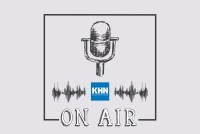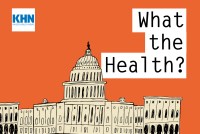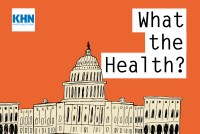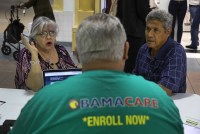Readers And Tweeters Fired Up Over Employer’s No-Nicotine Policy
Kaiser Health News gives readers a chance to comment on a recent batch of stories.
KHN’s ‘What The Health?’: SCOTUS Punts On ACA Case — For Now
The Supreme Court said it won’t hear an expedited case that threatens to overturn the Affordable Care Act. That means the future of the ACA will continue to be a top political issue through the November election. Meanwhile, a major doctors’ group endorses “Medicare for All.” Sort of. And both sides in the abortion debate mark the 47th anniversary of the Supreme Court’s landmark Roe v. Wade ruling. Margot Sanger-Katz of The New York Times, Alice Miranda Ollstein of Politico and Caitlin Owens of Axios join KHN’s Julie Rovner to discuss this and more. Also, for extra credit, the panelists suggest their favorite health policy stories of the week they think you should read, too.
Listen: How Vaping Regulations Are Playing Out In The States
KHN Midwest correspondent Lauren Weber joined Wisconsin Public Radio’s Rob Ferrett on “Central Time” to discuss the latest on vaping bans and what they mean for vaping trends among youth.
Listen: How High-Deductible Plans Hurt Rural America
Kaiser Health News senior correspondent Markian Hawryluk joined Colorado Public Radio’s Avery Lill on “Colorado Matters” to discuss his recent story on how high-deductible health plans are especially hurting the financial health of patients and hospitals in rural America.
KHN’s ‘What The Health?’: Trump Takes Credit Where It Isn’t Due
President Donald Trump says he “saved” popular protections for preexisting conditions, even though his administration is in court asking them to be struck down. Meanwhile, Democrats who want to run against Trump in the fall continue to argue among themselves over health issues. And Kansas may become the next state to expand Medicaid. Alice Miranda Ollstein of Politico, Tami Luhby of CNN and Shefali Luthra of Kaiser Health News join KHN’s Julie Rovner to discuss this and more.
KHN’s ‘What The Health?’: Democrats Roll Dice On SCOTUS And The ACA
A group of Democratic state attorneys general are betting the Supreme Court will take up the case and overturn a federal appeals court ruling in time for the 2020 elections. In other high-court news, most Republicans in Congress are asking the justices to use a Louisiana law to overturn the landmark abortion-rights ruling, Roe v. Wade. Joanne Kenen of Politico, Stephanie Armour of The Wall Street Journal and Paige Winfield Cunningham of The Washington Post join KHN’s Julie Rovner to discuss this and more. Rovner also interviews NPR’s Richard Harris, who wrote the latest KHN-NPR “Bill of the Month” feature.
Watch: Woman Hit With $28K Bill For A Throat Swab
A routine doctor’s visit for a sore throat brought more than $28,000 in charges for one New York City woman in our latest “Bill of the Month” installment.
KHN’s ‘What The Health?’: How Do Other Countries Pay For Health Care?
Every country provides and pays for health care differently. Yet surveys show the U.S. health system covers fewer people and costs more than the systems of most other industrialized countries. Are there international systems that the U.S. could emulate or borrow from? On this special episode of KHN’s “What the Health?” host Julie Rovner interviews international health experts Gerard Anderson of Johns Hopkins and Christopher Pope of the Manhattan Institute.
Readers And Tweeters: More Than Two Sides To Every Story
Kaiser Health News gives readers a chance to comment on a recent batch of stories.
Watch And Listen: The ACA In Limbo Again
KHN’s Julie Rovner is on PBS NewsHour and WBUR’s “Here & Now” to talk about the repercussions of a federal appeals court decision striking down the health law’s key requirement for people to get health coverage.



